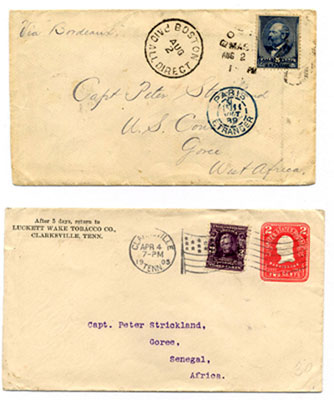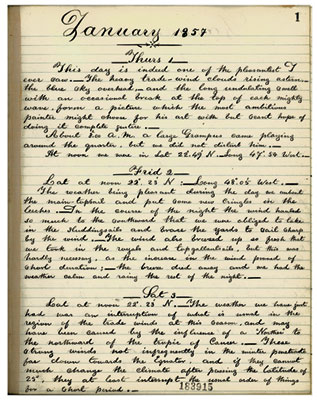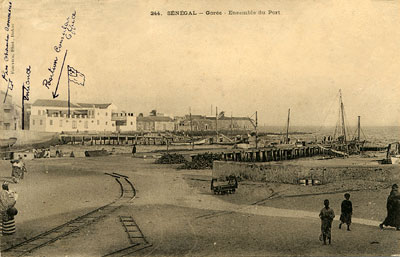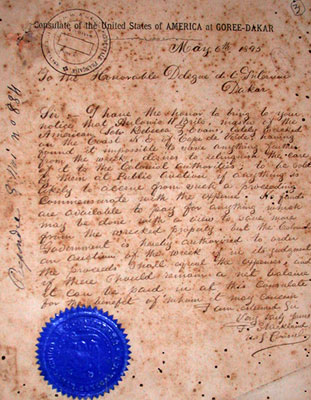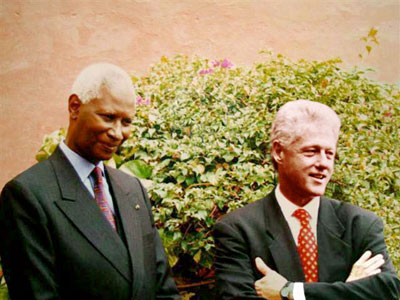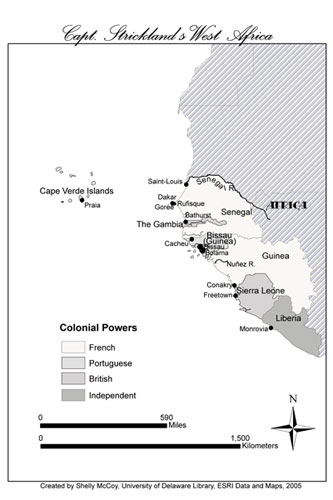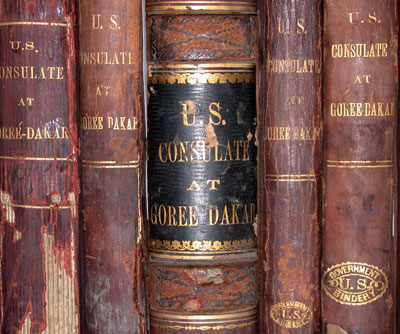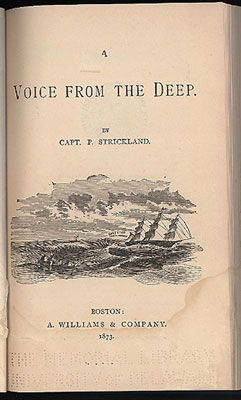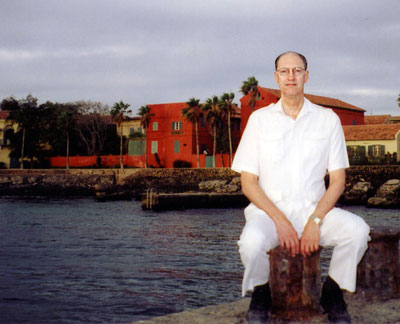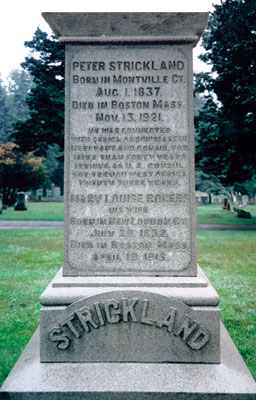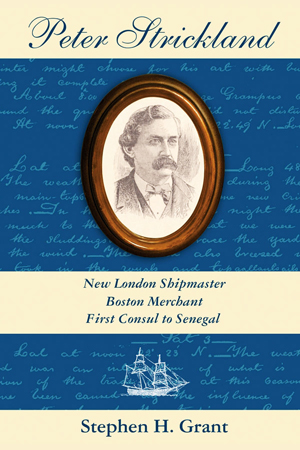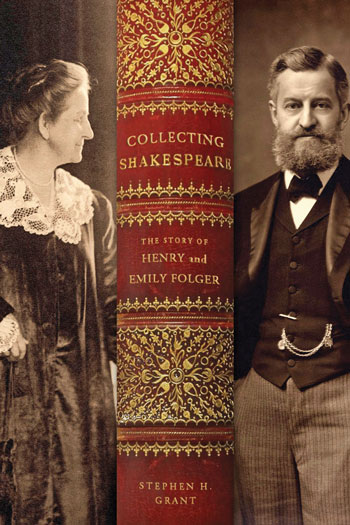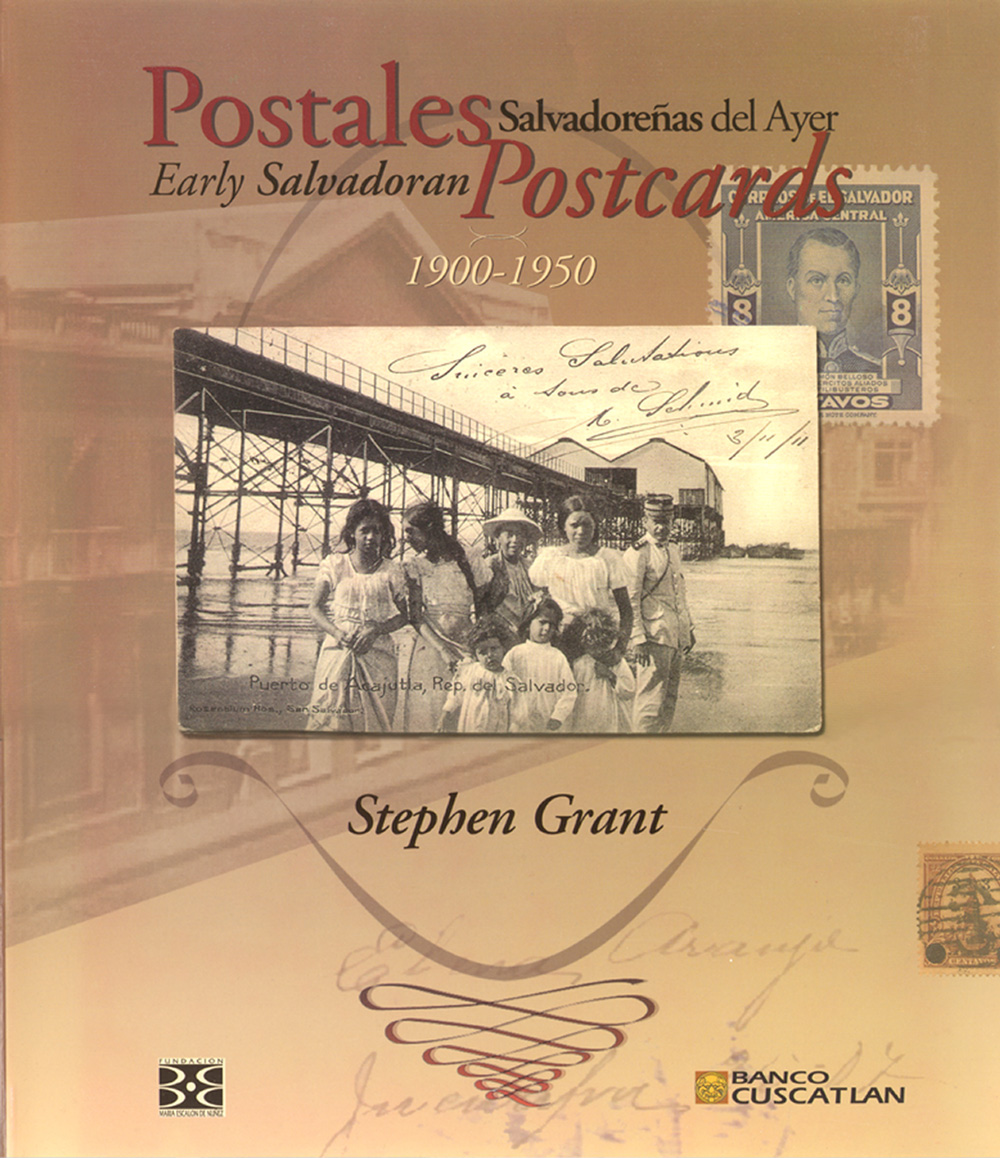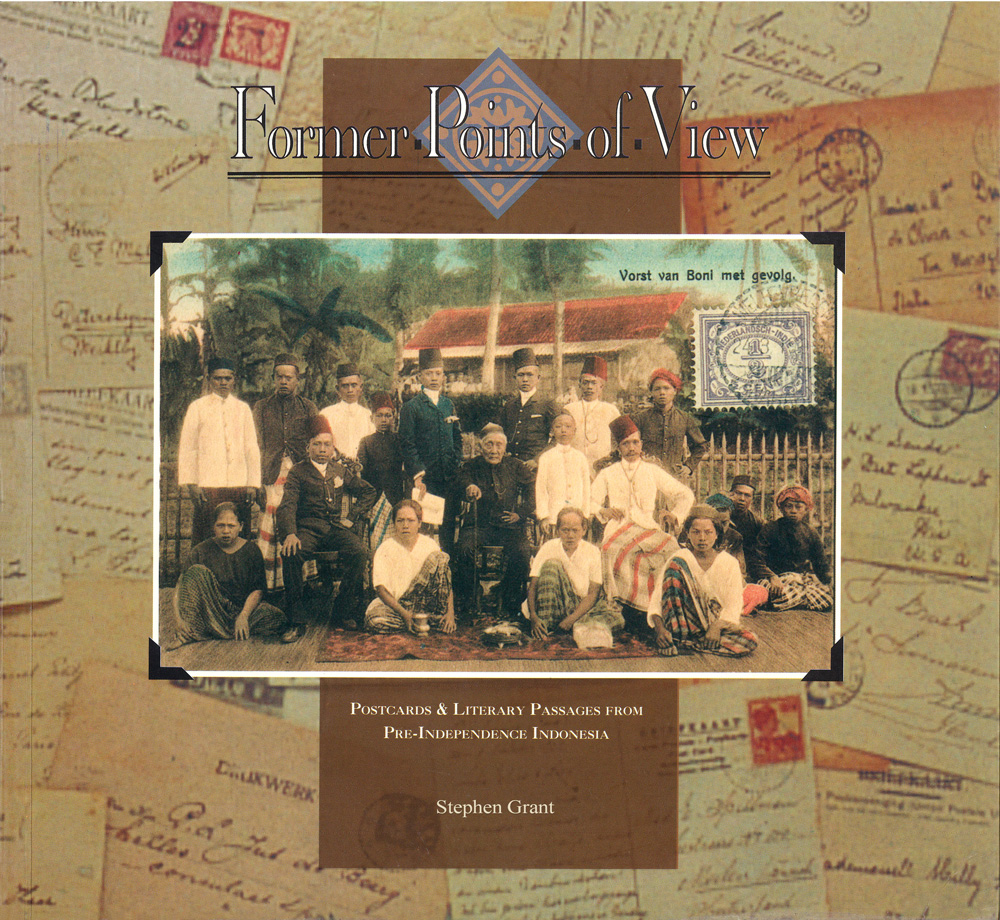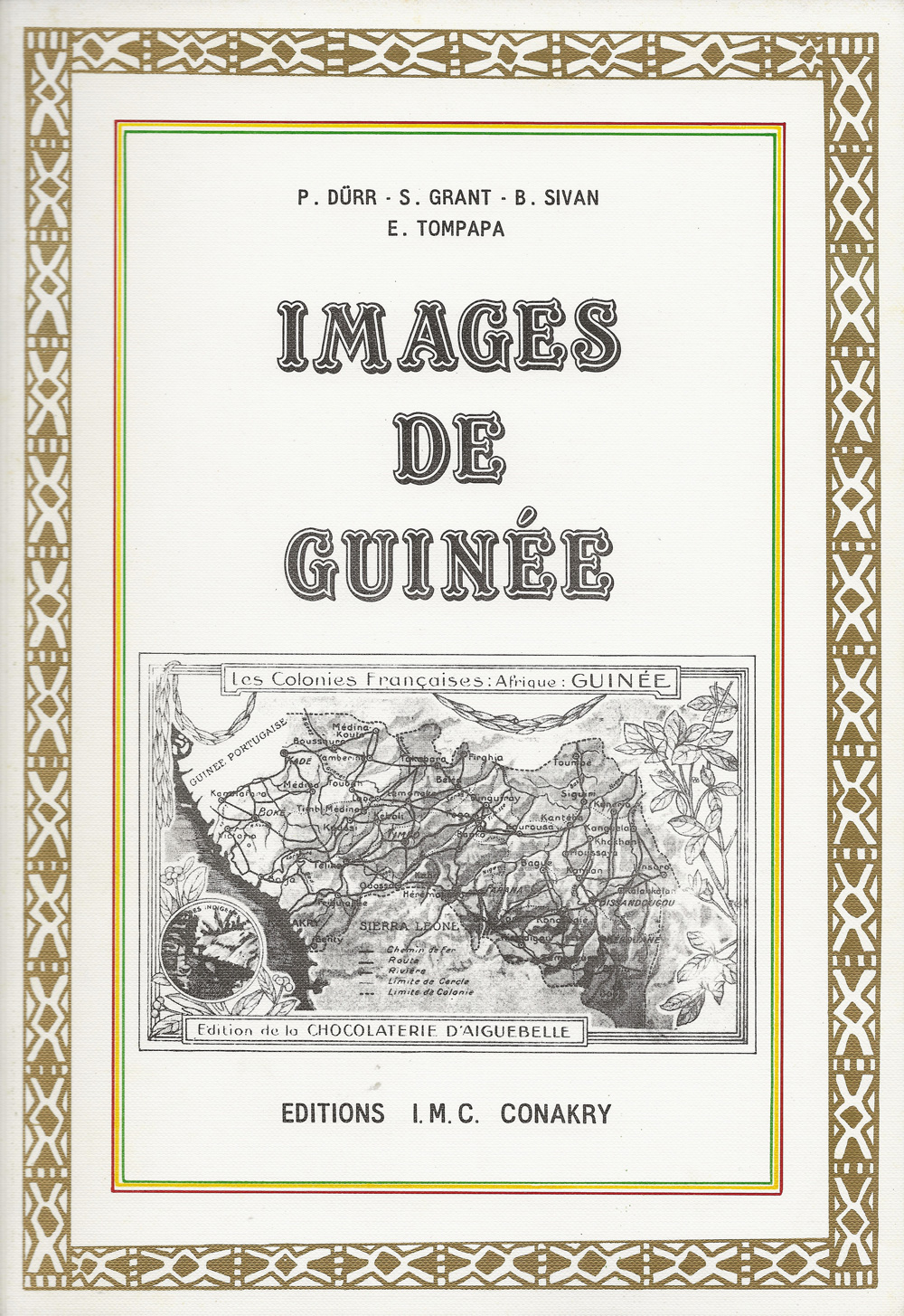PETER STRICKLAND:
New London Shipmaster, Boston Merchant, First Consul to Senegal
“This is a great new historical source for Senegal, and for 19th century American shipping, trade, and foreign relations.”
L. Rebecca Johnson Melvin, University of Delaware Library
 Peter Strickland might have slipped through history’s net were it not for the author’s purchase of an item on eBay. An envelope bearing a blue five-cent postage stamp of President James Garfield completed its journey from Boston via Paris, Bordeaux, and Marseilles and was delivered in 1889 to “Capt. Peter Strickland, U. S. Consul, Goree, West Africa.” Two repositories in the eastern U.S. house important collections of Peter Strickland’s papers: Mystic Seaport Library, Mystic, Connecticut and University of Delaware Library, Newark, Delaware. Papers contain ship logs, business ledgers, 2,000 business and personal letters from 1876 to 1921. Of paramount interest is a personal journal started in 1857 on a journal to Europe at the age of 19. The last entry was in 1921 at the age of 83, where the pen fell from his hand in mid-sentence. The journal is 2,500 pages. In addition, the National Archives and Records Administration in College, Park, Maryland holds the consul’s 272 consular dispatches sent from the French colony of Senegal to the State Department from 1883 to 1905. These handwritten reports are available on 35mm microfilm reels. NARA also possesses 16 bound volumes from Strickland’s period in West Africa, in all 1,850 pages of consular records, many in Strickland’s hand. Strickland authored a book, A Voice from the Deep, published in Boston in 1873. In it, he recounts details of the sailor’s five malefactors: shipping agents, ship owners, boarding masters, ship officers, and . . . consuls.
Peter Strickland might have slipped through history’s net were it not for the author’s purchase of an item on eBay. An envelope bearing a blue five-cent postage stamp of President James Garfield completed its journey from Boston via Paris, Bordeaux, and Marseilles and was delivered in 1889 to “Capt. Peter Strickland, U. S. Consul, Goree, West Africa.” Two repositories in the eastern U.S. house important collections of Peter Strickland’s papers: Mystic Seaport Library, Mystic, Connecticut and University of Delaware Library, Newark, Delaware. Papers contain ship logs, business ledgers, 2,000 business and personal letters from 1876 to 1921. Of paramount interest is a personal journal started in 1857 on a journal to Europe at the age of 19. The last entry was in 1921 at the age of 83, where the pen fell from his hand in mid-sentence. The journal is 2,500 pages. In addition, the National Archives and Records Administration in College, Park, Maryland holds the consul’s 272 consular dispatches sent from the French colony of Senegal to the State Department from 1883 to 1905. These handwritten reports are available on 35mm microfilm reels. NARA also possesses 16 bound volumes from Strickland’s period in West Africa, in all 1,850 pages of consular records, many in Strickland’s hand. Strickland authored a book, A Voice from the Deep, published in Boston in 1873. In it, he recounts details of the sailor’s five malefactors: shipping agents, ship owners, boarding masters, ship officers, and . . . consuls.
Grant’s biography of Strickland adds to our knowledge about what consuls did and how they did it. Strickland claimed he knew more about West African trade than any other American at that time. He made over 40 voyages during the Age of Sail from New England to West Africa, carrying in the holds of his schooners, brigs, and brigantines cargo of leaf tobacco from Kentucky and Tennessee, blocks of ice wrapped up in sawdust from the Kennebec River for refrigeration. The return voyage brought rubber, peanuts, animal hides to be made into shoes and boots, palm oil for cooking, and gum Arabic from the acacia tree for pharmaceuticals, inks, and adhesives.
Because Peter Strickland knew West Africa so well, the administration of President Chester Arthur appointed him consul for French West Africa with domicile on Gorée Island in Senegal, and covering Cape Verde Is., Liberia, The Gambia, Guinea, Bissau, and Sierra Leone. Today we are familiar with consular duties such as screening visa applicants, issuing visas and passports, recording births, marriages, and deaths of Americans, and looking after their whereabouts and welfare. In the 19th century, prime responsibilities were to further American shipping, record shipwrecks and accidents, offer protection to American travelers, report deaths of mariners including loss overboard.
Strickland also reported on rowdy, insolent, and intoxicated sailors. On Feb. 7, 1888, Peter Strickland’s only surviving son George drowned off the coast of Senegal at night. He was in command of the schooner M. E. Higgins on official mission sailing to the coastal town of Saint Louis. He reportedly fell from the rails where he was sitting. The body was never found and the circumstances of his death mysterious. He was 24 years old, a sea captain, and his father’s vice-consul.
Grant, Stephen H., Peter Strickland: New London Shipmaster, Boston Merchant, First Consul to Senegal. Washington, DC: New Academia, 2007, 236 pp. An Association for Diplomatic Studies and Training “Diplomats and Diplomacy Book.” ISBN 978-0-9787713-3-1. 30 images, 6 tables, 2 maps, 289 notes, chronology, bibliography, people index, place index, vessel index, general index.
“Capt. Peter Strickland owes much to author Stephen H. Grant.”
– Library of Congress
“Grant’s careful blending of historical hindsight with Strickland’s own words brings enormous value to our understanding of U.S. diplomacy.”
– Foreign Service Journal
“This book offers a vivid picture of the unique career of a New Englander who was a pioneer in the diplomatic field in French West Africa.”
– The Day, New London, Conn.
“[This] interesting and informative book on a little known connection between this area [New London] and the West African country of Senegal… opens a window to a neglected aspect of trade in the nineteenth century.”
– New London County Historical Society
“What began with the purchase of an envelope on eBay by a man interested in old postcards turned into six years of research culminating in an intriguing new book.”
– The Resident, Stonington, Conn.
“This is a great new historical source for Senegal, and for 19th century American shipping, trade, and foreign relations.”
– L. Rebecca Johnson Melvin, University of Delaware Library
“Stephen Grant has done a masterful job of weaving the strands and evidence of a multitalented individual’s life into a coherent collage with his biography of the seafaring entrepreneur Peter Strickland. The man had such a mixed life of professional success and unceasing personal tragedy. I thought about life in the mid-1800s: no cars, no planes, and less than luxurious ship conditions. I can’t blame his wife for retreating. Life as a whole was incredibly challenging in those days that Grant has written about in such an interesting way.”
– Mary-Charlotte Shealy
“[Strickland’s] career as consul is of interest to historians of Africa in its insights into late nineteenth-century commerce along the coast from Senegal to Sierra Leone and the impact upon the United States’ role of the onset of French colonialism. Through his consular dispatches, correspondence, and a journal spanning twenty-five years, he documents the primary imports and exports of Senegal to the U.S., but also the business and social relations among those serving European and American interests from Gorée and Dakar.”
– Roberta A. Dunbar, Department of African and Afro-American Studies, University of North Carolina
“Steve Grant’s biography is a little gem. The preface tells of the author’s search for his subject and reads with the pace and surprise of a treasure hunt. Grant has a special gift for writing history, perhaps especially biography. His eye for detail also sees his subject in the round and in all the colors of his time and setting.”
– Sam S. Rea
“Grant not only tells a good tale, but he has made an excellent use of a significant trove of historical materials in doing so, conducting extensive research on two continents, examining volumes of archival records and poring over Strickland’s six decades of personal journals.”
– Nina Robbins
“An entertaining, lively read. I do not remember reading anything that brings to life so well this period and the reality of living both in West Africa and in New England.”
– Arthur M. Fell
“Stephen Grant has written a wonderfully readable account of an exceptional personality.”
– Eunice Charles
“Stephen Grant’s biography [of Consul Peter Strickland] adds to our knowledge of what diplomats do and how they do it. . . . The contributions of our consuls have been too often ignored [and] Grant has taken a significant step toward remedying this.”
– from the Foreword by Kenneth L. Brown and Michael E. C. Ely
- Library of Congress
- Channel Islands Maritime Museum, Oxnard CA
- Town Hall Goree Senegal
- Maritime Museum New London CT
- West African Research Center, Dakar, Senegal
- Connecticut College
- Foreign Service Institute
- Alliance française, Washington DC
- Senghor Foundation, Dakar, Senegal
- Smithsonian Institution
- University of Massachusetts
“GOREE Pilgrim Award” presented by the Mayor of Gorée, Senegal
on the occasion of Grant’s talk in the Town Hall on Consul Peter Strickland, 2012
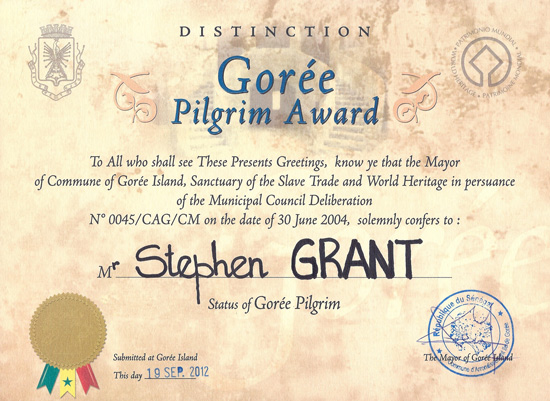
“Member of Honor” presented by the Historical Museum of Gorée, Senegal for Grant’s research and publications on Consul Peter Strickland, 2012
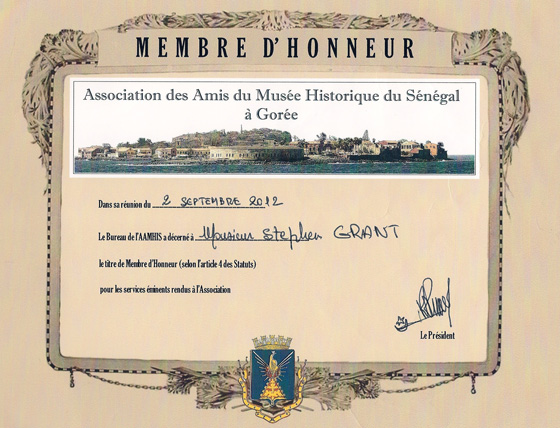
IMAGE GALLERY
CONNECT

